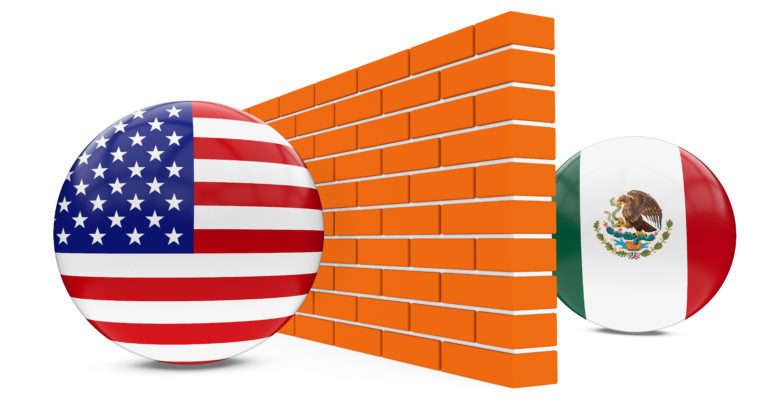Only The Best Deals: How Trump Got Pantsed By Mexico

The idea that Donald Trump successfully used the threat of tariffs to force Mexico to agree to an immigration deal is yet another fiction cooked up by the Trump propaganda machine.
Truth is, Trump squandered any negotiating leverage he may have had by making an idle threat that everybody knew he couldn’t possibly follow through on.
The threat of imposing an immediate 5% tariff on Mexican goods, and then gradually ratcheting up the rate to 25%, was never real. The stock market hated it. The Chamber of Commerce and other U.S. business groups hated it. American consumers hated it. American manufacturers and farmers hated it. Even Mitch McConnell and Ted Cruz hated it.
The prospect of Trump dropping that stink bomb into the U.S. economy in the run-up to a presidential election year was always a non-starter. Not even Trump is that stupid.
The Mexican government isn’t stupid, either. They fully understood that Trump’s only way out of the box he had put himself in was to find a way, any way, to withdraw his tariff threat by claiming that it had successfully forced Mexico to negotiate an immigration deal favorable to the U.S.
But far from creating negotiating leverage for the U.S., Trump’s threat did just the opposite.
It immediately shifted all of the negotiating leverage to Mexico.
While Trump might have created some leverage with his tariff threat if anybody believed he would follow through on it, everybody, including the Mexican government, knew he couldn’t. They knew that Trump had to find a way to declare victory to give himself political cover for withdrawing his threat.
That meant that Mexico had Trump over a barrel. Trump’s only choice was to agree to whatever cosmetic arrangement Mexico was willing to offer, or to follow through on a threat that would be tantamount to political suicide. For Trump, that was no choice at all.
In other words, Trump had backed himself, not Mexico, into a corner.
They had him. He had to cave.
And cave he did.
He got nothing.
The U.S.-Mexico Joint Declaration sets out two highly general, largely aspirational action areas, a “Mexican Enforcement Surge” and “Migrant Protection Protocols.” Everything else is mush, anodyne diplo-speak about how the U.S. and Mexico will “work together,” “continue their discussions,” and “lead in working with regional and international partners to build a more prosperous and secure Central America.”
The so-called “Mexican Enforcement Surge” is a rehash of what Mexico had already agreed to in prior discussions over the last few months. It says that Mexico will take “unprecedented steps” to curb irregular migration and give priority to its southern border. It doesn’t say what steps, how they will implement them, or when.
The “Migrant Protection Protocols” are also neither new nor specific. The Joint Declaration states only that Mexico will “expand the implementation” of the “existing Migrant Protection Protocols” that had already been negotiated, agreed to, and announced to Congress last December by then Secretary of Homeland Security Kirstjen Nielsen.
The Migrant Protection Protocols say that “those crossing the U.S. Southern border to seek asylum will be rapidly returned to Mexico where they may await the adjudication of their asylum claims.” But what does “rapidly” mean? And who does this apply to? Those who are already here? Those who will be entering in the future? Those who are in detention centers only, or also those who have already been released into the American public? How are these people going to be found and rounded up, much less “returned?”
The lack of specificity renders the Joint Declaration not only a rehash of an existing agreement, but largely insubstantial.
The real headline is not the vague generalities of the “new” Mexico deal, it is what is not in it. U.S. negotiators failed to get the one concession they really wanted, a “safe third country” treaty that would have given the U.S. the legal ability to reject asylum seekers if they had not sought refuge in Mexico first.
In other words, the U.S. obtained virtually nothing in this sham deal except a fig leaf to cover Trump’s withdrawal of a threat he should never have made in the first place.
“The Mexicans played Donald Trump,” Jorge Castaneda, Mexico’s former Foreign Minister, told Fareed Zakaria on his Sunday show. “Basically, they promised to do what they had already promised to do, and probably won’t do it.”
“Only the best deals” turns out to be a lot like “only the best people.”





‘North Korea is no longer a nuclear threat’.
‘Putin assures me that our intelligence agencies are wrong and Russia played no role in election interference.’
‘Thousands of Brits applauded me. The stories of protests are fake news.’
‘The Mueller Report ‘totally exonerates everyones’ favorite president’.
‘I didn’t sign up for Viet Nam because it is a country that is very far away and one nobody had ever even heard of.’
‘Nobody is interested in seeing my tax returns.’
‘I won’t have time to golf. I’ll be too busy being your president.’
‘I’ll get rid of Obamacare on day one and replace it with something much better and less expensive.’
‘Mexico will pay for the wall, which we’ve made great progress on but need additional funds to finish.’
‘People are saying that I’m second only to Lincoln as great presidents’ go.’
‘I’m a very stable genius.’
He delights in seeing how far he can take the con.
Yep